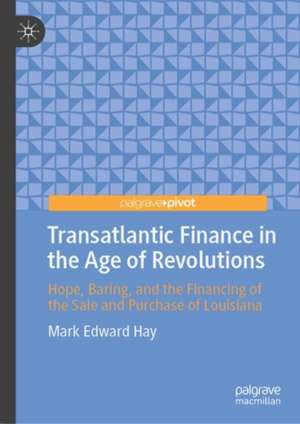Transatlantic Finance in the Age of Revolutions: Hope, Baring, and the Financing of the Sale and Purchase of Louisiana
Autor Mark Edward Hayen Limba Engleză Hardback – 29 sep 2024
This book examines the strategies and operations of the two main banking houses, Hope & Co. of Amsterdam and Francis Baring & Co. of London, involved in financing the cession of this territory from France to the United States. This book advances the scholarship not just on the Louisiana Cession, but also on international finance, the financial “sinews” of state power, Great Power diplomacy, the Atlantic Revolutions, and the Napoleonic Wars. It will be of interest to researchers and advanced students in all of these fields, at the intersection of history, politics, and economics.
Preț: 384.86 lei
Nou
Puncte Express: 577
Preț estimativ în valută:
73.64€ • 80.24$ • 62.05£
73.64€ • 80.24$ • 62.05£
Carte disponibilă
Livrare economică 02-16 aprilie
Preluare comenzi: 021 569.72.76
Specificații
ISBN-13: 9783031652318
ISBN-10: 3031652312
Pagini: 150
Ilustrații: Approx. 150 p. 20 illus.
Dimensiuni: 148 x 210 mm
Greutate: 0.34 kg
Ediția:2024
Editura: Springer International Publishing
Colecția Palgrave Macmillan
Locul publicării:Cham, Switzerland
ISBN-10: 3031652312
Pagini: 150
Ilustrații: Approx. 150 p. 20 illus.
Dimensiuni: 148 x 210 mm
Greutate: 0.34 kg
Ediția:2024
Editura: Springer International Publishing
Colecția Palgrave Macmillan
Locul publicării:Cham, Switzerland
Cuprins
Chapter 1 Louisiana in trade, politics and diplomacy.- Chapter 2 House of Hope House of Baring.- Chapter 3 Financing the Louisiana Purchase.- Chapter 4 Conclusion.
Notă biografică
Mark Edward Hay is an Assistant Professor at the Erasmus University Rotterdam, the Netherlands. His research explores the European financial economy in the Age of Revolutions, 1780-1830, with a particular focus on the evolution of Amsterdam credit networks and the market for international government lending, and how Amsterdam merchant-banking houses navigated the troubled times. His current research project examines Napoleonic war financing.
Textul de pe ultima copertă
This book explains how Amsterdam financiers played a much more important role in financing the Louisiana Cession than they are credited for. Drawing on hitherto overlooked Dutch archival sources, alongside American, French and British archival sources, this book shows that in 1803 the international financial order was not yet centered on London, but that the financing of the Louisiana Cession initiated a shift of this order from Dutch to British firms, which would become more apparent after the Napoleonic Wars.
This book examines the strategies and operations of the two main banking houses, Hope & Co. of Amsterdam and Francis Baring & Co. of London, involved in financing the cession of this territory from France to the United States. This book advances the scholarship not just on the Louisiana Cession, but also on international finance, the financial “sinews” of state power, Great Power diplomacy, the Atlantic Revolutions, and the Napoleonic Wars. It will be of interest to researchers and advanced students in all of these fields, at the intersection of history, politics, and economics.
Mark Edward Hay is an Assistant Professor at the Erasmus University Rotterdam, the Netherlands. His research explores the European financial economy in the Age of Revolutions, 1780-1830, with a particular focus on the evolution of Amsterdam credit networks and the market for international government lending, and how Amsterdam merchant-banking houses navigated the troubled times. His current research project examines Napoleonic war financing.
This book examines the strategies and operations of the two main banking houses, Hope & Co. of Amsterdam and Francis Baring & Co. of London, involved in financing the cession of this territory from France to the United States. This book advances the scholarship not just on the Louisiana Cession, but also on international finance, the financial “sinews” of state power, Great Power diplomacy, the Atlantic Revolutions, and the Napoleonic Wars. It will be of interest to researchers and advanced students in all of these fields, at the intersection of history, politics, and economics.
Mark Edward Hay is an Assistant Professor at the Erasmus University Rotterdam, the Netherlands. His research explores the European financial economy in the Age of Revolutions, 1780-1830, with a particular focus on the evolution of Amsterdam credit networks and the market for international government lending, and how Amsterdam merchant-banking houses navigated the troubled times. His current research project examines Napoleonic war financing.
Caracteristici
Explicates the strategies and operations of two main private firms, Hope & Co. in Amsterdam and Baring & Co. in London Explains how Amsterdam financiers played important role in financing the Louisiana Purchase than they are credited for Shows how the financing of the Louisiana Purchase is reflective of broader trends
